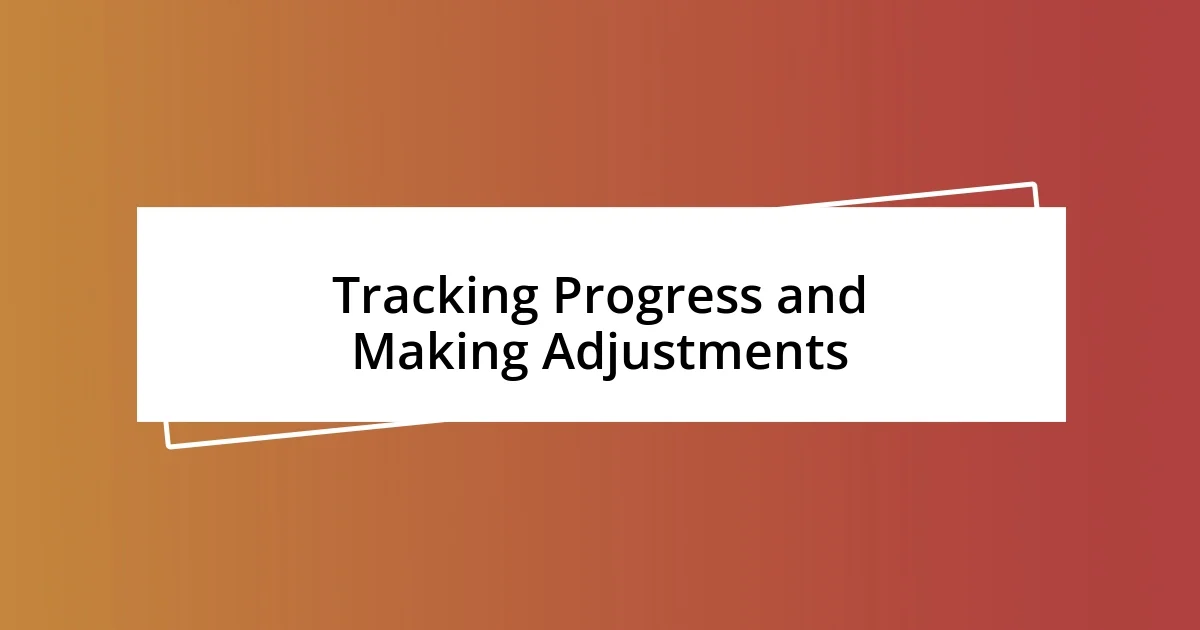Key takeaways:
- Understand your current fitness level to set realistic, achievable goals and build confidence.
- Utilize the SMART framework (Specific, Measurable, Achievable, Relevant, Time-bound) to effectively structure and track your fitness goals.
- Celebrate small achievements and maintain flexibility in your plan to overcome obstacles and stay motivated throughout your fitness journey.

Understanding Your Current Fitness Level
Understanding your current fitness level is crucial before setting any goals. I remember when I first started my fitness journey; I thought I could jump right into advanced workouts. But, I soon realized that not taking stock of where I was led to frustration and setbacks. Have you ever felt overwhelmed trying to keep up with others? It’s important to assess your strength, endurance, and flexibility to form a clear picture of your fitness foundation.
After a few months of consistent effort, I decided to track my progress more methodically. Using simple benchmarks like the number of push-ups or timed runs revealed aspects of my fitness I hadn’t acknowledged before. This awareness helped me set goals that were not just ambitious but also achievable. How do you currently measure your progress?
Understanding my starting point allowed me to set mini-goals, like increasing my gym sessions or improving my run time. Each small win built my confidence, creating a sense of accomplishment and motivation. It’s fascinating how recognizing your current abilities can empower your fitness journey. Have you thought about what your own metrics could reveal about your potential?

Setting SMART Fitness Goals
Setting SMART fitness goals can truly transform your fitness journey. The SMART framework stands for Specific, Measurable, Achievable, Relevant, and Time-bound. When I first learned about SMART goals, it felt like having a blueprint for my fitness success. For instance, instead of saying, “I want to get stronger,” I started saying, “I will do three sets of 10 push-ups by the end of the month.” This specificity allowed me to focus my efforts and really evaluate my progress. Have you considered how clarity in your goals could change your approach?
Measuring progress is essential in this process. I recall targeting a specific distance for my runs. Initially, setting a goal to run 5 kilometers in 30 minutes seemed daunting, but breaking it down into weekly targets made it manageable. By tracking my runs and noting how my pace improved, I felt more motivated. This act of measurement turned what was once an intimidating challenge into a series of achievable steps. Have you thought about how tracking your milestones could enhance your motivation?
I’ve also learned that relevance is key when setting fitness goals. Once, I aimed to lift a certain weight because friends were doing it, but it didn’t align with my interests. Reassessing my goals, I shifted my focus to improving my yoga practice, which brought me joy. This change re-energized my commitment and led to greater satisfaction and progress. So, what matters to you on your fitness journey? Aligning your goals with your passions can make all the difference.
| SMART Criteria | Description |
|---|---|
| Specific | Clearly define your goal. |
| Measurable | Set criteria to track progress. |
| Achievable | Ensure your goal is realistic. |
| Relevant | Your goal should matter to you. |
| Time-bound | Set a deadline to keep you accountable. |

Identifying Motivations for Fitness
Identifying what truly motivates you to pursue fitness can significantly enhance your journey. For me, the initial spark came from wanting to feel more energetic during daily activities. I remember dragging myself through work, feeling sluggish, and realizing I wanted to reclaim my vitality. Reflecting on why I started—whether it was improving my mood, building confidence, or simply wanting to enjoy life more—helped me anchor my goals. What about you? What drives your desire for fitness?
Here are some insights into common motivations for fitness that might resonate with you:
- Physical Health: Motivated by the desire to lower health risks or manage existing conditions.
- Mental Well-being: Seeking stress relief or a boost in mood through physical activity.
- Social Connection: Joining classes or working out with friends for community and support.
- Personal Achievement: Striving to conquer a challenging fitness task, like a marathon or a new lift.
- Aesthetic Goals: Wanting to improve body image or feel more comfortable in one’s skin.
Identifying your motivation can bathe your fitness journey in determination and excitement. It’s more than just a checklist; it’s about finding what fuels your passion and keeps you going. So, take a moment—what does fitness mean to you?

Creating an Actionable Plan
Creating an actionable plan is where the magic happens. I remember when I wanted to improve my strength training. I broke my goal down into simple, achievable steps. Instead of just saying I wanted to lift heavier, I structured my workouts to focus on specific exercises each week, progressively increasing the weights. This way, every session felt purposeful, and I could clearly see how I was advancing. How do you structure your own workouts to keep them effective?
I find that scheduling workouts in advance makes it easier to stick to my goals. When I committed to going to the gym every Tuesday and Thursday morning, I made it a non-negotiable part of my routine. Initially, it felt challenging, but over time, I genuinely started to look forward to those early sessions. Having that consistency built a rhythm in my life, giving me momentum that pushed me forward on tougher days. What routines have you implemented that keep you on track?
Lastly, I believe in the power of flexibility within a plan. Life can be unpredictable, and I’ve learned to adapt without feeling defeated. If I had to skip a workout for some reason, I adjusted my schedule rather than giving up. One week, I swapped a gym session for a home workout, finding joy in the change of scenery and method. This approach kept my motivation high and reinforced my commitment to stay active. How do you stay adaptable with your fitness goals?

Tracking Progress and Making Adjustments
Tracking your progress can be an empowering experience. I remember the first time I logged my workouts and noticed my improvements in strength. It was truly motivating to see numbers go up each week; it gave me a tangible sense of success. Have you ever tracked your workouts? It’s fascinating to witness those small victories accumulate and keep you focused on the bigger picture.
However, simply tracking progress isn’t enough; it’s crucial to be willing to make adjustments as you go. After a few months, I realized that certain exercises weren’t yielding the results I hoped for. It took some reflection, but I swapped them out for more effective movements. This flexibility not only kept my workouts fresh but also aligned them with my evolving goals. Have you ever needed to pivot in your fitness routine? Embracing change can often lead to breakthroughs.
Finally, setting regular check-ins is essential in this journey. I often take time at the end of each month to reflect on what worked and what didn’t. This practice of self-assessment helps me realign my strategies and stay motivated. I’ve found that small course corrections can lead to significant progress over time. How do you assess your journey? Taking a moment to evaluate can really sharpen your focus and reignite your passion for your fitness goals.

Overcoming Common Fitness Obstacles
Sometimes, the biggest fitness obstacles come from our own minds. I recall a period when I set a goal to run a half marathon, but the thought of the distance overwhelmed me. I had to reframe my approach and focus on smaller milestones instead. Setting mini-goals, like running just a mile without stopping, not only made the task seem manageable but helped build my confidence each time I ticked another box. Have you ever experienced a mental barrier that seemed insurmountable?
Injuries can also pose significant setbacks. I remember developing a nagging knee issue during my training, and it felt disheartening to pause my routine. Instead of just feeling defeated, I sought out alternatives. I explored low-impact exercises like swimming and yoga, which kept me active without putting stress on my knee. This experience taught me the importance of being proactive about recovery rather than letting it derail my whole fitness journey. How do you handle setbacks when they appear?
Social commitments can often clash with fitness goals, but I learned to leverage my friendships. When a friend invited me to join a group fitness class, I hesitated. However, I ended up enjoying the camaraderie and support from others striving toward similar goals. It transformed a potential obstacle into a shared journey, making it much easier to stay motivated. Have you ever found a workout buddy who made a difference in your routine? Making fitness a group effort can often sustain your enthusiasm and create a more enjoyable experience.

Celebrating Achievements and Milestones
Celebrating achievements is a vital part of the fitness journey. I remember the thrill I felt when I reached my first goal of consistently attending the gym three times a week for a month. That small but significant milestone made me feel like I was on the right path, and I celebrated it with a special treat—my favorite smoothie, which felt well-deserved. How do you reward yourself when you reach a goal?
It’s important to recognize that milestones don’t always have to be monumental. Sometimes, just completing a challenging workout can feel like a victory. After a particularly intense spin class, I found myself grinning from ear to ear as I high-fived a fellow participant. Those little moments of celebration foster a sense of community and keep me energized for my next workout. Have you experienced those spontaneous celebrations that remind you why you started?
I often share my fitness wins with friends and family; this creates an accountability network that feels incredibly supportive. Just last week, I posted about achieving a new personal record on my deadlift. The responses made me feel proud and connected. It’s humbling to see how sharing these moments can encourage others, too. What are some of the ways you celebrate your achievements, and who do you share them with?













